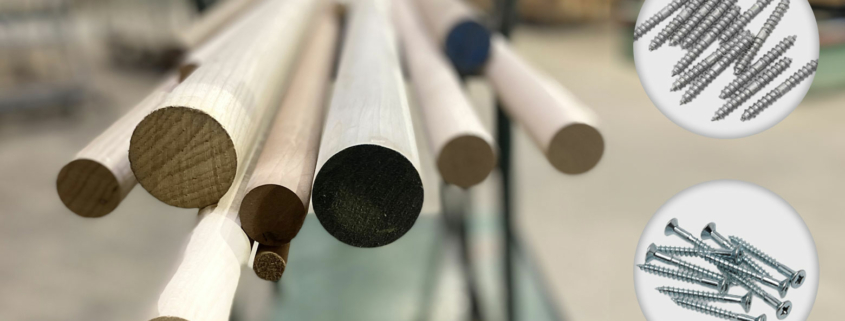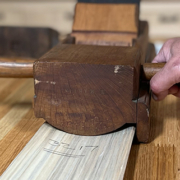Dowels vs. Screws: Determine Which Joinery Method Is Best for Your Woodworking Project
Dowel vs. screws, screws vs. dowels – if you’re planning a woodworking project, you might be asking yourself which one you should use. When it comes to modern joinery methods, screws are the go-to for manufacturers looking to churn out a high volume of product. But, just because screws are good for fast work, it doesn’t necessarily mean they’re the right fit for your DIY woodworking projects.
Dowels are often labeled as time-consuming or difficult for beginners to master – however, dowel joinery is worth the time and effort to learn. If it’s a strong joint you want, then it’s most likely dowels – not screws – that you need.
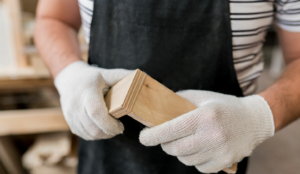
What Is a Dowel Joint?
A dowel joint is a type of woodworking joint that has been utilized for centuries. The technique involves drilling pilot holes and inserting wooden pegs (aka dowel rods) along with wood glue to connect the pieces. (Dowel rods can be made of a type of wood, metal or plastic.)
With this particular method, you have to be careful to select the right drill bit so that the dowel fits snuggly in the hole – a loose-fitting dowel can mean trouble for your joint. Dowels come in a few standard sizes and you can either buy long dowels to cut and sand down to the size you need or purchase pre-cut dowels.
Dowel Screws
Dowel screws – also called double-ended screws – are used in carpentry to create hidden joints. They’re similar to both screws and dowels – they have two threaded ends like screws but no screw head. Instead, they are a cylinder that you insert into a pilot hole. For dowel screws you do not use a screwdriver. Instead, you insert the tips into the wood pieces and spin the wood to bore the dowel screw into the material.
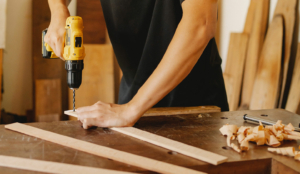
How to Incorporate Dowel Joinery
For each dowelled joint, you should use at least two dowels. First, you drill holes in one piece of wood – about half the length of your dowel in depth. Then you drill holes in the second piece of wood. Make sure to wipe away any excess sawdust as you drill. When the dowel is inserted in both pieces of wood, the lumber should sit flush.
Once you are sure that each workpiece is fitted together properly, you remove the dowels and begin gluing. Fill the first hole with wood glue or epoxy and reinsert the dowel. Tap it down with a mallet. Then fill the second hole with glue and insert the other end of the dowel in it. Wipe away any excess glue and apply clamps to keep the joint tight while it dries.
One of the greatest difficulties beginners face when using dowel joinery is knowing what size dowel to use and where to drill the hole. Fortunately, you can purchase a dowel jig to help guide your drill bit. You can also purchase dowel centers to help you mark where the hole should be drilled.
Which Is the Best Fastener?
When it comes to strong joints, dowels are at the top of the list – even stronger than mortise and tenon joints. When properly drilled and glued, dowel joinery outperforms screws.
Keep in mind that the kind of wood that the dowel is made of can affect how strong it is – softwood and hardwood dowel rods perform differently. When looking for the most durable dowel rods, it’s best to check how hard the wood is on the Janka scale. But, even taking that into consideration – dowels are the stronger joint by far.
Screws are, of course, the fastest method since you don’t have to wait for glue to dry. Most beginners feel more comfortable using screws since dowel rods can be more difficult to insert, and if they break, they can be even harder to remove. However, the dowel joinery method is definitely worth learning to use properly, especially if you’re hoping to evolve into a more experienced woodworker. Not only are they incredibly strong, but since they are a hidden joint, they also make for a more attractive final product.
Can Pocket Hole Joints Out-Perform Dowel Woodworking Projects?
Speaking of hidden joints, it’s worth us mentioning the option of utilizing pocket holes. With this method of joinery, you incorporate a handy pocket hole jig to drill holes into the wood, and then attach two pieces together with mechanical fasteners (aka pocket hole screws).
While this method is certainly a nice option and delivers an easy alternative for less experienced woodworkers, pocket holes are still not as strong as dowel joints. Why is that, you ask? Well, since a dowelled butt joint allows for more surface area when it comes to wood glue, it results in a stronger bond.
For woodworking projects that are only visible from one side (like picture frames, cabinetry, shelves, etc.), pocket holes are a nice, quick alternative. However, if you’re working on a project that will be visible from multiple angles and requires strength and longevity, dowel joints win every single time.
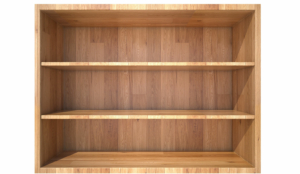
Build It Better With Baird Brothers
When it comes to dowels vs. screws for DIY woodworking applications, the answer is simple. When you want a strong joint and a smooth surface, dowel joinery is the way to go. Craftsmanship takes time, and the strength of a dowel joint is worth the wait and practice.
When you’re ready to get building, Baird Brothers Fine Hardwoods has your back. We have everything you need, from dowel rods to high-quality lumber. Shop our online store to get started building a better DIY project today.

